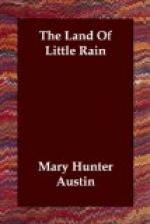Says Three Finger, relating the history of the Mariposa, “I took it off’n Tom Beatty, cheap, after his brother Bill was shot.”
Says Jim Jenkins, “What was the matter of him?”
“Who? Bill? Abe Johnson shot him; he was fooling around Johnson’s wife, an’ Tom sold me the mine dirt cheap.”
“Why didn’t he work it himself?”
“Him? Oh, he was laying for Abe and calculated to have to leave the country pretty quick.”
“Huh!” says Jim Jenkins, and the tale flows smoothly on.
Yearly the spring fret floats the loose population of Jimville out into the desolate waste hot lands, guiding by the peaks and a few rarely touched water-holes, always, always with the golden hope. They develop prospects and grow rich, develop others and grow poor but never embittered. Say the hills, It is all one, there is gold enough, time enough, and men enough to come after you. And at Jimville they understand the language of the hills.
Jimville does not know a great deal about the crust of the earth, it prefers a “hunch.” That is an intimation from the gods that if you go over a brown back of the hills, by a dripping spring, up Coso way, you will find what is worth while. I have never heard that the failure of any particular hunch disproved the principle. Somehow the rawness of the land favors the sense of personal relation to the supernatural. There is not much intervention of crops, cities, clothes, and manners between you and the organizing forces to cut off communication. All this begets in Jimville a state that passes explanation unless you will accept an explanation that passes belief. Along with killing and drunkenness, coveting of women, charity, simplicity, there is a certain indifference, blankness, emptiness if you will, of all vaporings, no bubbling of the pot,—it wants the German to coin a word for that,—no bread-envy, no brother-fervor. Western writers have not sensed it yet; they smack the savor of lawlessness too much upon their tongues, but you have these to witness it is not mean-spiritedness. It is pure Greek in that it represents the courage to sheer off what is not worth while. Beyond that it endures without sniveling, renounces without self-pity, fears no death, rates itself not too great in the scheme of things; so do beasts, so did St. Jerome in the desert, so also in the elder day did gods. Life, its performance, cessation, is no new thing to gape and wonder at.
Here you have the repose of the perfectly accepted instinct which includes passion and death in its perquisites. I suppose that the end of all our hammering and yawping will be something like the point of view of Jimville. The only difference will be in the decorations.
MY NEIGHBOR’S FIELD
It is one of those places God must have meant for a field from all time, lying very level at the foot of the slope that crowds up against Kearsarge, falling slightly toward the town. North and south it is fenced by low old glacial ridges, boulder strewn and untenable. Eastward it butts on orchard closes and the village gardens, brimming over into them by wild brier and creeping grass. The village street, with its double row of unlike houses, breaks off abruptly at the edge of the field in a footpath that goes up the streamside, beyond it, to the source of waters.




